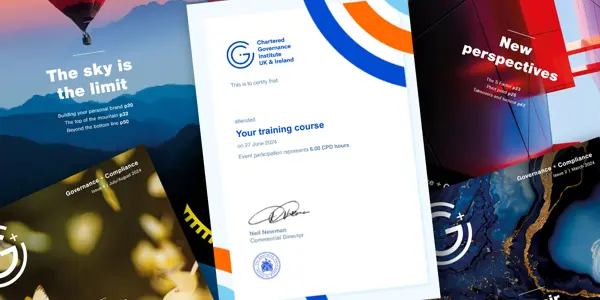Overview
Company directors are more exposed than ever. To regulators. To shareholder action. To the realities of the current business climate.
This essential course covers the director's responsibilities, liabilities, and best practice in the boardroom.
Course costs (ex VAT)
Non-member - £949
Professional subscriber - £849
Member - £749
A discount is available for registered charities, please email training@cgi.org.uk.
For any related enquiries please contact us at training@cgi.org.uk, or call us at +44 (0)20 7580 4741
Participant Profile
-
Are you looking to learn what the primary responsibilities of a Director are?
-
Do you want to understand the essential knowledge and skills needed to be a competent Director?
-
Are you interested in knowing what governance support you should provide to a Director as a governance professional?
This Directors and their duties training course is relevant to executive and non-executive directors of listed and private companies.
Learning outcomes
By the end of this course, participants will be able to:
- Understand the key duties, roles and responsibilities of directors.
- Explain the legal issues, liabilities, sanctions and indemnities applicable to directors.
- Describe how to manage the relationship between the company and its shareholders and stakeholders.
- Understand what good boardroom practice and board relationships look like, including managing conflicts.
- Explore approaches to continuous improvement in board performance, including inductions and performance reviews.
You will also receive:
- A delegate pack containing comprehensive course notes and presentation slides
- A certificate to show you have attended the course
- 6 hours credit towards your Continuing Professional Development (CPD)
- 6 months complimentary professional subscription of The Chartered Governance Institute UK & Ireland. This includes a subscription to G+C Magazine as well as access to briefings, discounts and our knowledge base.

Testimonials
"Really good delivery, lots of anecdotes to illustrated points."
"Lyn was a great trainer, highly knowledgeable, engaging and she has given me the confidence to really carry out my duties as a director. I don't feel as exposed now for sure! I also have some takeaways to think how we could do things better in the future and areas we perhaps could focus more on."
"Lyn was an extremely good trainer for this course. She clearly has an excellent knowledge of the subject and made everyone feel at ease. The levels of interaction was good, along with the number and length of breaks throughout the day. The course content is excellent also."
People who take this course often go on to book:
Useful CGI Resources:
- Non-Executive Directors’ Handbook, 5th edition
- Corporate Governance Unlocked
- Directors’ general duties under the Companies Act – guidance note
A wealth of further information and guidance on effective board-level governance can be found in our Resources.
Competency framework
This course aligns to CGI’s competency framework: Emerging/Established
Use the competency framework to identify your strengths and areas for improvement in governance.
Programme
- What is the purpose of company law and how does it apply to directors?
- What else do you need to be aware of?
- What does the Act have to say about directors’ duties, including conflicts of interest?
- What are the practical implications for running a company?
- What can go wrong?
- How can you avoid it?
- How can you fix it?
- How do you know what you are allowed to do as a director?
- What are the differences between directors, managers and owners?
- Case Studies
- What else do you need to be thinking about?
- What does an effective board look like?
- What does it do and how should it behave?
Course Leader

